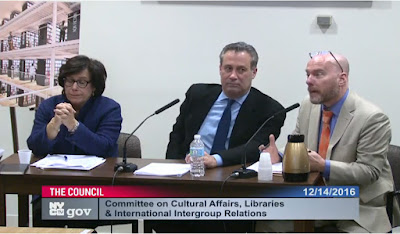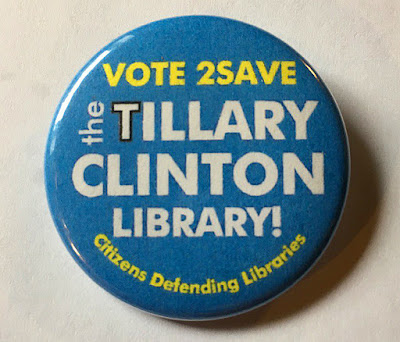 |
| Citizens Defending Libraries co-founder Michael D. D. White testifying |
The oral testimony of Citizens Defending Libraries is up on our Citizens Defending Libraries YouTube Channel- City Council Testimony 12/14/2016: Removal of Books From Libraries & Surveillance.
The entire hearing is viewable on the video posted by the City Council. If you go to the very end of that video (at 1:26) you can watch Citizens Defending Libraries co-founder Michael D. D. White testifying and then afterward the exchanges he had with the City Councilman, first with Councilman Van Bramer about whether there should be concern related to the hiring of Booz Allen Hamilton and the possibility of the surveillance at the library, and then with Councilman Andy King about what information Citizens Defending Libraries would like to have forthcoming from the library administration and what Citizens Defending Libraries agreed and disagreed with about the plan, including the proposed elimination of SIBL and science books.
Also available on our YouTube Channel is the NYPL's CGI video presentation of the plan that incorporates some of the hearing testimony about the project and its overall $300 million cost: NYPL's CGI Video Presentation of Mid-Manhattan Renovation Plan. We have also included in a clip of Ralph Nader concerning the politics of surveillance and the libraries from "Project Censored," and a clip from "On The Media" concerning data, particular science data about climate that could disappear and the need for robust library support.
* * * *
December 14, 2016
City Council Committee & Subcommittee:
-Subcommittee on Libraries
-Committee on Cultural Affairs,
Libraries and International Intergroup Relations
City Hall
City Hall Park
New York, NY 10007
Re: Submission of supplemental testimony respecting Oversight - NYPL Schwarzman Building (i.e. 42nd Street Central Reference Library) and Midtown Campus Plans and against the proposed sale of the 34th Street Science, Industry and Business library, the elimination of books and the surveillance of library patrons.
Dear City Council Committee and Subcommittee:
Last night at the Mid-Manhattan Library the NYPL presented design and plans to the public with respect to its proposed replacement for the Mid-Manhattan Library and the 34th Street Science, Industry and Business Library (SIBL). The proposed replacement, if you track your history, also replaces most of what was the Donnell Library as well. It affects the 42nd Street Central Reference Library which has been threatened by the NYPL with serious destruction that would have included destruction of the core research stacks designed to hold three million books. Those stacks are now empty, drastically reducing that libraries capacity to hold books.
At the presentation the NYPL said they would answer the public’s questions, but the NYPL refused to answer critical basic questions about their plan.
NYPL Won’t Answer The Question: “How Many Books Is It Banishing?”
Asked how many books SIBL used to hold, not just the other day, but before concoction of the Central Library Plan when we know that there were well over one million books in SIBL, and, similarly, asked how many books the Mid-Manhattan Library used to hold the NYPL refused to answer. Whether the NYPL didn’t answer because they don’t know or simply because the didn’t want to, either is unacceptable.
The NYPL did answer one related question: How many books will the library replacing Mid-Manhattan and SIBL hold. The answer was with the books that will be brought from SIBL: “Just over 400,000,” which is far less than even half of the books that were at SIBL alone.
At the presentation, multiple members of the public followed up objecting to the NYPL’s refusal to answer the question about the missing books. One such member of the public criticized as a “PR locution” the NYPL’s repeating over and over again the phrase that “there will be as many book in the library as there are in the libraries now,” without answering about all the books asked about that have disappeared. Another member of the public described in detail how she had watched books and book shelves disappearing from Mid-Manhattan with what seemed to be a concurrent dumbing down of the books available.
Additionally, the NYPL blithely said at the presentation that it had abandoned collection of science books, expecting that people can resort to “the internet” to learn about science instead. This is at a time when climate change is probably the greatest threat to the continued existence of this planet and climate change and all of its possible solutions are undoubtably a matter of science.
NYPL Won’t Answer The Question: “Why Did It Hire Booz Allen Hamilton, A Top Spy Firm Working For The U.S. Government, Before Launching These Book Banishing Plans?”
The NYPL was asked why, in connection with its library reorganization plans banishing books, the NYPL hired Booz Allen Hamilton, a top private surveillance firm with the U.S. government as its main client, shortly after the NYPL’s board (according to its minutes) was advised that it was expected that the federal government was going to “require” the NYPL “to reengineer their Internet service facilities to enhance law enforcement’s ability to monitor and intercept communications.”
Also to be considered is why, with the Mayor’s office inserting itself to require it, all three New York City library systems engaged Booz & Co. in connection with reorganization that would involve similar banishment of books from library premises.
Will The City Council Ask These Questions?
The City Council is hereby advised that these questions have been asked and the NYPL has refused to answer them. It is not as if these questions haven‘t been asked of the NYPL in the past; they have and were unanswered then as well.
You as City Council can ask these absolutely essential questions and insist on answers. If you do not, you become complicit in perpetuating obfuscation and mystery to which the public should not be subject.
What we are talking about are basic issues of free speech, democracy and, especially urgent today, robust protections for freedom of thought.
We refer you to the articles (available on the web), together with our resource web page “Articles About Library Privacy and Surveillance In Libraries” listed in the attached addendum, the first of which is also printed out and attached.
Sincerely,
Michael D. D. White
Citizens Defending Libraries
ADDENDUM
• Noticing New York: American Library Association Issues "Advocacy Alert" About "Massive Privacy Threat" of U.S. Government Remotely Hacking Library Computers and NYPL Issues "Privacy Policy"- Is "Privacy" At Libraries Actually Protected? December 6, 2016
• Noticing New York: Snowden, Booz and the Dismantling of Libraries As We Know Them: Why Was A Private Government Spy Agency Hired to Take Apart New York's Most Important Libraries And Turn Them Into Something Else? October 30, 2016
• Noticing New York: Too Close For Comfort? Real Estate Addresses- Blackstone, Booz Allen Hamilton, The Libraries & Bryant Park, November 16, 2016
• Citizens Defending Libraries: Articles About Library Privacy and Surveillance In Libraries, December 6, 2016
• Noticing New York: Libraries And Climate Change: The Dangerous Destruction of Information We May Need To Know To Survive, February 11, 2014
 |
| Councilman Andy King, Chair of the Council's Library Subcommittee |
 |
| Michael D. D. White displaying New York Times headline "Hacking The Democrats" for Councilman Van Bramer during their discussion. |
















